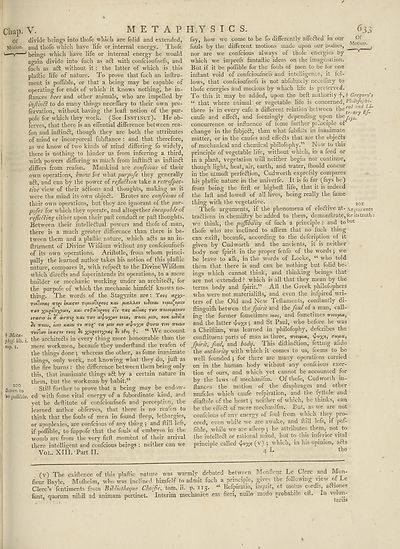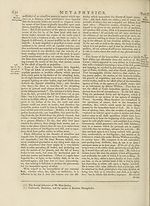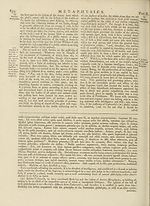Encyclopaedia Britannica, or, a Dictionary of arts, sciences, and miscellaneous literature : enlarged and improved. Illustrated with nearly six hundred engravings > Volume 13, MAT-MIC
(679) Page 633
Download files
Complete book:
Individual page:
Thumbnail gallery: Grid view | List view

V. M E T A P
divide beings into tbofe which are folid and extended,
and thofe which have life or internal energy. Thofe
beings which have life or internal energy he would
again divide into fuch as aft with confcioufnefs, and
fuch as aft without it : the latter of which is this
plaftic life of nature. To prove that fuch an inftru-
ment is poflible, or that a being may be capable of
operating for ends of which it knows nothing, he in-
ftances bees and other animals, who are impelled by
inJHnB to do many things neceflfary to their ourn pre-
fervation, without having the lealt notion of the pur-
pofe for which they Avork. (See Instinct). He ob-
ferves, that there is an effential difference betiveen rea-
fon and inftinft, though they are both the attributes
of mind or incorporeal fubftance : and that therefore,
as Ave knoAV of two kinds of mind differing fo Avidely,
there is nothing to hinder us from inferring a third,
Avith powers differing as much from inftinft as inftinft
differs from reafon. Mankind are confcions of their
own operations, know for Avhat purpofe they generally
aft, and can by the poAver of refleEHon take a retrofpec-
tive view of their aftions and thoughts, making as it
Avere the mind its oAvn objeft. Brutes are confcious of
their oavu operations, but they are ignorant of the pur-
pofes for which they operate, and altogether incapable of
refleBing either upon their paft conduft or paft thoughts.
BetAveen their intelleftual poAvers and thofe of man,
there is a much greater difference than there is be-
tAveen them and a plaftic nature, which afts as an in-
ftrument of Divine Wifdom Avithout any confcioufnefs
of its oAvn operations. Ariftotle, from whom princi¬
pally the learned author takes his notion of this plaftic
nature, compares it, Avith refpeft to the Divine Wifdom
Avhich direfts and fuperintends its operations, to a mere
builder or mechanic Avorking under an architeff, for
the purpofe of which the mechanic himfelf knuivs no¬
thing. The wmrds of the Stagyrite are : Tovs
T£»7ov«f TipitoUgOVS KCtt pxXMv U^iVXt VOp.lfypiV
rh)v ,cct'1 oh ra? mijixi; ruv Troiovpivuv
Krounv oi aiTTrig x.xi reuv mix. Train piv, ovx. eidoha
eis Train, otov xcttsi to Trvf>’ rx pit ovv a^vgoo (pv/rn Tin Tram')
Tovjoav Bxxfav Tons %t‘gaTi%vxg h tiog •f. 44 We account
the architefts in every thing more honourable than the
mere workmen, becaufe they underftand the reafon of
the things done •, Avhereas the other, as fome inanimate
things, only Avork, not knowing Avhat they do, juft as
the fire burns : the difference between them being only
this, that inanimate things aft by a certain nature in
them, but the Avorkman by habit.”
Stift further to prove that a being may be endoAv-
Vepoilible. ed with fome vital energy of a fubordinate kind, and
yet be deftitute of confcioufnefs and perception, the
learned author obferves, that there is no reafon to
think that the fouls of men in found fleep, lethargies,
or apoplexies, are confcious of any thing ; and ft ill lefs,
if poflible, to fuppofe that the fouls of embryos in the
womb are from the very firft moment of their arrival
there intelligent and confcious beings : neither can we
Vol. XIII. Part II.
f Mcta-
pbyf lib.
eap. i.
£hown to
H,Y SICS.
fay, hoAV avc come to be fo differently affefted in our
fouls by the different motions made upon our oodies,
nor are Ave confcious always of thole energies by
Avhich we imprefs fantaftic ideas on the imagination.
But if it be poflible for the fouls of men to be tor one
inftant void of confcioufnefs and intelligence, it fol¬
lows, that confcioufnels is not abfolutcly neceffary to
thofe energies and motions by which life is preierved.
To this it may be added, upon the belt authority f, + G'r^orv’r
44 that where animal or vegetable life is concerned, Philofoyhi-
there is in e\'ery cafe a different relation between the
caufe and effect, and feemingly depending upon they^.
concurrence or influence of lome farther principle of
change in the fubjedt, than Avhat fubfifts in inanimate
matter, or in the caufes and effedts that are the objedts
of mechanical and chemical philofophy.” Now to this
principle of vegetable life, Avithout Avhich, in a feed or
in a plant, vegetation Avill neither begin nor continue,
though light, heat, air, earth, and Avater, Ihould concur
in the utmoft perfection, Cudivorth exprefsly compares
his plaftic nature in the univerfe. It is fo far (fays he)
from being the firft or higheft life, that it is indeed
the laft and loAveft of all lives, being really the fame
thing with the vegetative. _ 20X
Thefe arguments, if the phenomena of eledtive at- Arguments
tradlions in chemiftry be added to them, demonftrate, for its truth:
Ave think, the pojfibility of fuch a principle: and tobut
thofe Avho are inclined to affirm that no fuch thing
can exift, becaufe, according to the defeription of it
given by Cud worth and the ancients, it is neither
body nor fpirit in the proper fenfe of the words 5 we
be leave to alk, in the Avords of Locke, 44 who told
them that there is and can be nothing but folid be¬
ings which cannot think, and thinking beings that
are not extended? Avhich is all that they mean by the
terms body and fpirit.” All the Greek philofophers
avIio were not. materialifts, and even the infpired Avri-
ters of the Old and Ncav Teftaments, conflantly di-
ftinguiffi betAven the fpirit and the foul of a man, call¬
ing the former fometimes vovg, and fometimes Trnvpct,
and the latter and St Paul, who before he was
a Chriftian, was learned in philofophy, deferibes the
conftituent parts of man as three, Trnvfut, ■4/vX»>
fpirit, foul, and body. This diftinclion, fetting afide
the authority with Avhich it comes to us, feems to be
well founded j for there are many operations carried
on in the human body without any confcious exer¬
tion of ours, and which yet cannot be accounted for
by the Lavs of mechanifm. Of thefe, Cudworth in-
ftances the motion of the diaphragm and other
mufcles Avhich caufe refpiration, and the fyilole and
diaftole of the heart ; neither of Avhich, he thinks, can
be the effedt of mere meehanifm. But, as Ave are not
confcious of any energy of foul from Avhich they* pro--
ceed, even Avhile Ave are aivake, and ftill lefs, if pof-
fible, while Ave are afleep ; he attributes them, not. to
the intellect or rational mind, but to this inferior vital
principle called Tpvyv (v) } Avhich, in his opinion, adts
4 L the
(v) The exiftence of this plaftic nature was warmly debated between Monfieur Le Clerc and Mon-
fieur Bayle. Moffieim, who was inclined himfelf to admit fuch a principle, gives the following view of Le
Clerc’s fentiments from Bibliotheyue Choifre, tom. ii. p. 113. “ Refpiratio, inquit, et motus cordis adhones
funt, quorum nihil ad animam pertinet. Interim mechanice eas fieri, nuilo modo nrobabile eft. In volun-
divide beings into tbofe which are folid and extended,
and thofe which have life or internal energy. Thofe
beings which have life or internal energy he would
again divide into fuch as aft with confcioufnefs, and
fuch as aft without it : the latter of which is this
plaftic life of nature. To prove that fuch an inftru-
ment is poflible, or that a being may be capable of
operating for ends of which it knows nothing, he in-
ftances bees and other animals, who are impelled by
inJHnB to do many things neceflfary to their ourn pre-
fervation, without having the lealt notion of the pur-
pofe for which they Avork. (See Instinct). He ob-
ferves, that there is an effential difference betiveen rea-
fon and inftinft, though they are both the attributes
of mind or incorporeal fubftance : and that therefore,
as Ave knoAV of two kinds of mind differing fo Avidely,
there is nothing to hinder us from inferring a third,
Avith powers differing as much from inftinft as inftinft
differs from reafon. Mankind are confcions of their
own operations, know for Avhat purpofe they generally
aft, and can by the poAver of refleEHon take a retrofpec-
tive view of their aftions and thoughts, making as it
Avere the mind its oAvn objeft. Brutes are confcious of
their oavu operations, but they are ignorant of the pur-
pofes for which they operate, and altogether incapable of
refleBing either upon their paft conduft or paft thoughts.
BetAveen their intelleftual poAvers and thofe of man,
there is a much greater difference than there is be-
tAveen them and a plaftic nature, which afts as an in-
ftrument of Divine Wifdom Avithout any confcioufnefs
of its oAvn operations. Ariftotle, from whom princi¬
pally the learned author takes his notion of this plaftic
nature, compares it, Avith refpeft to the Divine Wifdom
Avhich direfts and fuperintends its operations, to a mere
builder or mechanic Avorking under an architeff, for
the purpofe of which the mechanic himfelf knuivs no¬
thing. The wmrds of the Stagyrite are : Tovs
T£»7ov«f TipitoUgOVS KCtt pxXMv U^iVXt VOp.lfypiV
rh)v ,cct'1 oh ra? mijixi; ruv Troiovpivuv
Krounv oi aiTTrig x.xi reuv mix. Train piv, ovx. eidoha
eis Train, otov xcttsi to Trvf>’ rx pit ovv a^vgoo (pv/rn Tin Tram')
Tovjoav Bxxfav Tons %t‘gaTi%vxg h tiog •f. 44 We account
the architefts in every thing more honourable than the
mere workmen, becaufe they underftand the reafon of
the things done •, Avhereas the other, as fome inanimate
things, only Avork, not knowing Avhat they do, juft as
the fire burns : the difference between them being only
this, that inanimate things aft by a certain nature in
them, but the Avorkman by habit.”
Stift further to prove that a being may be endoAv-
Vepoilible. ed with fome vital energy of a fubordinate kind, and
yet be deftitute of confcioufnefs and perception, the
learned author obferves, that there is no reafon to
think that the fouls of men in found fleep, lethargies,
or apoplexies, are confcious of any thing ; and ft ill lefs,
if poflible, to fuppofe that the fouls of embryos in the
womb are from the very firft moment of their arrival
there intelligent and confcious beings : neither can we
Vol. XIII. Part II.
f Mcta-
pbyf lib.
eap. i.
£hown to
H,Y SICS.
fay, hoAV avc come to be fo differently affefted in our
fouls by the different motions made upon our oodies,
nor are Ave confcious always of thole energies by
Avhich we imprefs fantaftic ideas on the imagination.
But if it be poflible for the fouls of men to be tor one
inftant void of confcioufnefs and intelligence, it fol¬
lows, that confcioufnels is not abfolutcly neceffary to
thofe energies and motions by which life is preierved.
To this it may be added, upon the belt authority f, + G'r^orv’r
44 that where animal or vegetable life is concerned, Philofoyhi-
there is in e\'ery cafe a different relation between the
caufe and effect, and feemingly depending upon they^.
concurrence or influence of lome farther principle of
change in the fubjedt, than Avhat fubfifts in inanimate
matter, or in the caufes and effedts that are the objedts
of mechanical and chemical philofophy.” Now to this
principle of vegetable life, Avithout Avhich, in a feed or
in a plant, vegetation Avill neither begin nor continue,
though light, heat, air, earth, and Avater, Ihould concur
in the utmoft perfection, Cudivorth exprefsly compares
his plaftic nature in the univerfe. It is fo far (fays he)
from being the firft or higheft life, that it is indeed
the laft and loAveft of all lives, being really the fame
thing with the vegetative. _ 20X
Thefe arguments, if the phenomena of eledtive at- Arguments
tradlions in chemiftry be added to them, demonftrate, for its truth:
Ave think, the pojfibility of fuch a principle: and tobut
thofe Avho are inclined to affirm that no fuch thing
can exift, becaufe, according to the defeription of it
given by Cud worth and the ancients, it is neither
body nor fpirit in the proper fenfe of the words 5 we
be leave to alk, in the Avords of Locke, 44 who told
them that there is and can be nothing but folid be¬
ings which cannot think, and thinking beings that
are not extended? Avhich is all that they mean by the
terms body and fpirit.” All the Greek philofophers
avIio were not. materialifts, and even the infpired Avri-
ters of the Old and Ncav Teftaments, conflantly di-
ftinguiffi betAven the fpirit and the foul of a man, call¬
ing the former fometimes vovg, and fometimes Trnvpct,
and the latter and St Paul, who before he was
a Chriftian, was learned in philofophy, deferibes the
conftituent parts of man as three, Trnvfut, ■4/vX»>
fpirit, foul, and body. This diftinclion, fetting afide
the authority with Avhich it comes to us, feems to be
well founded j for there are many operations carried
on in the human body without any confcious exer¬
tion of ours, and which yet cannot be accounted for
by the Lavs of mechanifm. Of thefe, Cudworth in-
ftances the motion of the diaphragm and other
mufcles Avhich caufe refpiration, and the fyilole and
diaftole of the heart ; neither of Avhich, he thinks, can
be the effedt of mere meehanifm. But, as Ave are not
confcious of any energy of foul from Avhich they* pro--
ceed, even Avhile Ave are aivake, and ftill lefs, if pof-
fible, while Ave are afleep ; he attributes them, not. to
the intellect or rational mind, but to this inferior vital
principle called Tpvyv (v) } Avhich, in his opinion, adts
4 L the
(v) The exiftence of this plaftic nature was warmly debated between Monfieur Le Clerc and Mon-
fieur Bayle. Moffieim, who was inclined himfelf to admit fuch a principle, gives the following view of Le
Clerc’s fentiments from Bibliotheyue Choifre, tom. ii. p. 113. “ Refpiratio, inquit, et motus cordis adhones
funt, quorum nihil ad animam pertinet. Interim mechanice eas fieri, nuilo modo nrobabile eft. In volun-
Set display mode to:
![]() Universal Viewer |
Universal Viewer | ![]() Mirador |
Large image | Transcription
Mirador |
Large image | Transcription
Images and transcriptions on this page, including medium image downloads, may be used under the Creative Commons Attribution 4.0 International Licence unless otherwise stated. ![]()
| Permanent URL | https://digital.nls.uk/192692874 |
|---|
| Attribution and copyright: |
|
|---|
| Description | Ten editions of 'Encyclopaedia Britannica', issued from 1768-1903, in 231 volumes. Originally issued in 100 weekly parts (3 volumes) between 1768 and 1771 by publishers: Colin Macfarquhar and Andrew Bell (Edinburgh); editor: William Smellie: engraver: Andrew Bell. Expanded editions in the 19th century featured more volumes and contributions from leading experts in their fields. Managed and published in Edinburgh up to the 9th edition (25 volumes, from 1875-1889); the 10th edition (1902-1903) re-issued the 9th edition, with 11 supplementary volumes. |
|---|---|
| Additional NLS resources: |
|

